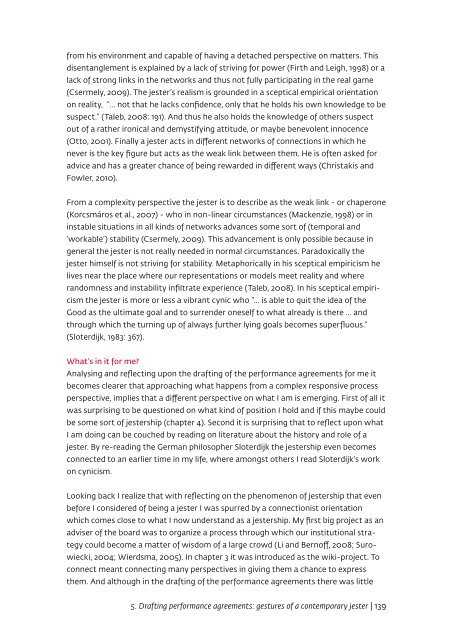Rumbling on performativity_Frits Simon
Rumbling on performativity_Frits Simon
Rumbling on performativity_Frits Simon
Create successful ePaper yourself
Turn your PDF publications into a flip-book with our unique Google optimized e-Paper software.
from his envir<strong>on</strong>ment and capable of having a detached perspective <strong>on</strong> matters. This<br />
disentanglement is explained by a lack of striving for power (Firth and Leigh, 1998) or a<br />
lack of str<strong>on</strong>g links in the networks and thus not fully participating in the real game<br />
(Csermely, 2009). The jester’s realism is grounded in a sceptical empirical orientati<strong>on</strong><br />
<strong>on</strong> reality, “… not that he lacks c<strong>on</strong>fidence, <strong>on</strong>ly that he holds his own knowledge to be<br />
suspect.” (Taleb, 2008: 191). And thus he also holds the knowledge of others suspect<br />
out of a rather ir<strong>on</strong>ical and demystifying attitude, or maybe benevolent innocence<br />
(Otto, 2001). Finally a jester acts in different networks of c<strong>on</strong>necti<strong>on</strong>s in which he<br />
never is the key figure but acts as the weak link between them. He is often asked for<br />
advice and has a greater chance of being rewarded in different ways (Christakis and<br />
Fowler, 2010).<br />
From a complexity perspective the jester is to describe as the weak link - or chaper<strong>on</strong>e<br />
(Korcsmáros et al., 2007) - who in n<strong>on</strong>-linear circumstances (Mackenzie, 1998) or in<br />
instable situati<strong>on</strong>s in all kinds of networks advances some sort of (temporal and<br />
‘workable’) stability (Csermely, 2009). This advancement is <strong>on</strong>ly possible because in<br />
general the jester is not really needed in normal circumstances. Paradoxically the<br />
jester himself is not striving for stability. Metaphorically in his sceptical empiricism he<br />
lives near the place where our representati<strong>on</strong>s or models meet reality and where<br />
randomness and instability infiltrate experience (Taleb, 2008). In his sceptical empiricism<br />
the jester is more or less a vibrant cynic who “... is able to quit the idea of the<br />
Good as the ultimate goal and to surrender <strong>on</strong>eself to what already is there ... and<br />
through which the turning up of always further lying goals becomes superfluous.”<br />
(Sloterdijk, 1983: 367).<br />
What’s in it for me?<br />
Analysing and reflecting up<strong>on</strong> the drafting of the performance agreements for me it<br />
becomes clearer that approaching what happens from a complex resp<strong>on</strong>sive process<br />
perspective, implies that a different perspective <strong>on</strong> what I am is emerging. First of all it<br />
was surprising to be questi<strong>on</strong>ed <strong>on</strong> what kind of positi<strong>on</strong> I hold and if this maybe could<br />
be some sort of jestership (chapter 4). Sec<strong>on</strong>d it is surprising that to reflect up<strong>on</strong> what<br />
I am doing can be couched by reading <strong>on</strong> literature about the history and role of a<br />
jester. By re-reading the German philosopher Sloterdijk the jestership even becomes<br />
c<strong>on</strong>nected to an earlier time in my life, where am<strong>on</strong>gst others I read Sloterdijk’s work<br />
<strong>on</strong> cynicism.<br />
Looking back I realize that with reflecting <strong>on</strong> the phenomen<strong>on</strong> of jestership that even<br />
before I c<strong>on</strong>sidered of being a jester I was spurred by a c<strong>on</strong>necti<strong>on</strong>ist orientati<strong>on</strong><br />
which comes close to what I now understand as a jestership. My first big project as an<br />
adviser of the board was to organize a process through which our instituti<strong>on</strong>al strategy<br />
could become a matter of wisdom of a large crowd (Li and Bernoff, 2008; Surowiecki,<br />
2004; Wierdsma, 2005). In chapter 3 it was introduced as the wiki-project. To<br />
c<strong>on</strong>nect meant c<strong>on</strong>necting many perspectives in giving them a chance to express<br />
them. And although in the drafting of the performance agreements there was little<br />
5. Drafting performance agreements: gestures of a c<strong>on</strong>temporary jester | 139



